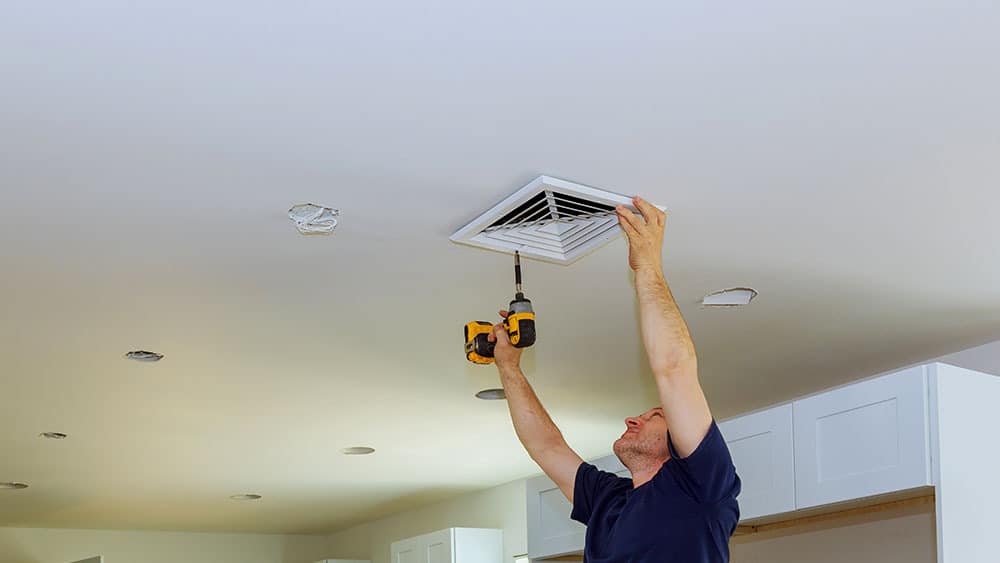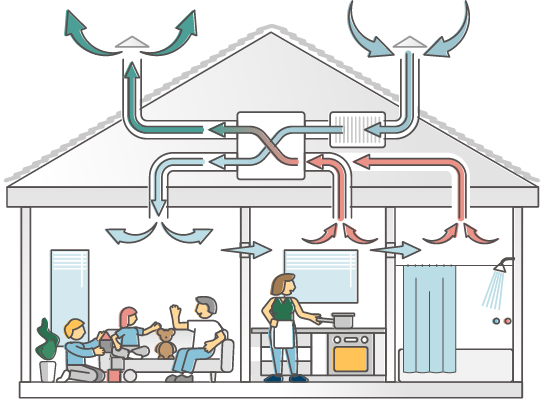The Hidden Health Risks of Poor Home Ventilation Melbourne
The Function of Home Ventilation in Protecting Against Mold And Mildew and Indoor Allergens
Home ventilation is an important part in maintaining a healthy interior environment. It regulates humidity levels, which can prevent the development of mold and the buildup of allergens. Numerous property owners overlook the significance of proper air flow, often leading to unseen issues. Understanding just how ventilation systems function and their effect on air high quality can be the trick to a healthier home. What steps can be required to boost these systems properly?
Understanding Home Air Flow Equipments
While many homeowners may neglect the relevance of ventilation, recognizing home ventilation systems is essential for preserving indoor air top quality and avoiding mold development - Home Ventilation Melbourne. These systems promote the exchange of stale indoor air with fresh outside air, properly decreasing pollutants and wetness degrees. Usual kinds consist of all-natural ventilation, which depends on wind and temperature level differences, and mechanical ventilation, which uses air ducts and fans to regulate air flow. Furthermore, balanced air flow systems combine both methods to enhance air top quality. Effectively designed and preserved air flow systems can assist control temperature level and moisture, ensuring a comfortable living atmosphere. Home owners need to take into consideration aspects like home format, climate, and occupancy when selecting an air flow system to ideal fit their needs and improve overall air top quality
The Effect of Humidity on Mold And Mildew Growth
Moisture plays an essential role in mold and mildew development, making it a vital factor for home owners to check. Mold and mildew prospers in settings where humidity degrees surpass 60%, as these problems provide the moisture essential for spores to sprout and multiply. High humidity can result from different sources, consisting of poor ventilation, water leakages, and cooking or showering tasks. When humidity levels stay raised, mold and mildew can develop swiftly on organic materials such as drywall, textile, and timber. Property owners need to utilize dehumidifiers and assure appropriate air flow in locations vulnerable to moisture, such as shower rooms and basements. Preserving indoor humidity in between 30% and 50% can substantially minimize the risk of mold development, adding to a much healthier living atmosphere.
Determining Common Indoor Allergens
Indoor environments can harbor a range of allergens that impact health and convenience. Typical interior irritants include dust termites, pet dog dander, mold and mildew spores, and pollen. Allergen grow in bedding, rugs, and upholstery, eating organic product and adding to respiratory concerns. Pet dander, composed of little flakes from skin and hair, can trigger allergies in delicate individuals. Mold spores, typically existing in damp locations, can affect and multiply air top quality. Furthermore, pollen can infiltrate homes through open windows or on clothes. Determining these allergens is important for preserving a healthy interior environment. Recognition of their presence allows home owners to take positive actions to lessen direct exposure and enhance total indoor air quality.
Benefits of Correct Ventilation
Correct air flow is crucial for preserving a healthy and balanced interior environment, as it assists to control air top quality and reduce the accumulation of pollutants. Ample air movement helps with the exchange of indoor and exterior air, therefore diluting basics damaging substances such as volatile organic substances, irritants, and dust. This procedure not just improves comfort yet additionally contributes to the overall health of residents by lessening breathing concerns (Home Ventilation Melbourne). Furthermore, proper air flow effectively controls humidity levels, reducing the possibility of mold development and cultivating a drier setting favorable to health and wellness. Additionally, it can enhance power performance by making sure that cooling and heating systems operate better, resulting in lower energy prices. In general, appropriate air flow is an essential part in promoting a read safe and healthy home

Tips for Improving Home Air Flow
Although several house owners may neglect it, boosting home ventilation is essential for boosting air top quality and protecting against mold growth. One efficient technique is to regularly open home windows to advertise cross-ventilation, permitting fresh air to circulate. Mounting exhaust followers in shower rooms and kitchen areas can effectively eliminate moisture-laden air, reducing moisture degrees. Homeowners ought to also take into consideration using air purifiers with HEPA filters to record toxins and irritants. Consistently keeping heating and cooling systems, consisting of changing filters, warranties come to a head airflow and performance. Securing leaks around doors and home windows can prevent outdoors air from getting in, which aids maintain a regular indoor environment. Integrating houseplants can normally improve air top quality while including visual worth to the home.
Often Asked Questions
How Often Should I Tidy My Home Air Flow System?
Determining just how frequently to clean a home air flow system depends on numerous factors, including usage and environmental problems. Home Ventilation Melbourne. Typically, specialists recommend a detailed cleansing every three to five years to maintain ideal airflow and efficiency
Can Plants Aid Lower Indoor Allergens?
Research study shows that particular indoor plants may help decrease allergens by boosting air top quality and raising humidity. Nonetheless, their effectiveness varies, and preserving a tidy environment continues to be necessary for handling indoor irritants efficiently.
What Kinds Of Air Filters Are Ideal for Mold And Mildew Avoidance?

Are There Specific Ventilation Requirements for Basements?

How Do I Know if My Air Flow Is Working Successfully?
To determine efficient air flow, one need to keep track of humidity degrees, examine air movement through vents, and observe signs of condensation or stagnant air. Regular analyses can show whether the system sufficiently circulates and exchanges indoor air.
Recognizing exactly how ventilation systems feature and their influence on air top quality can be the key to a much healthier living space. While many home company website owners might neglect the value of ventilation, recognizing home air flow systems is important for preserving interior air top quality and stopping mold and mildew development. Typical types include all-natural air flow, which depends on wind and temperature level differences, and mechanical air flow, which utilizes followers and ducts to control airflow. Proper air flow is necessary for keeping a healthy and balanced interior setting, as it helps to regulate air quality and reduce the build-up of contaminants. Numerous house owners might overlook it, enhancing home air flow is necessary for enhancing air quality and preventing mold and mildew development.